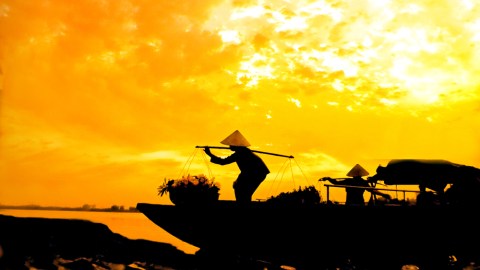How’s the Economy Doing? Ask a Local

My mandate is to look at all emerging markets which represent about 80 percent of the global population. So it’s a fairly wide universe that I end up covering. So how do you define emerging markets? The definition that I use is typically about any country with a per capita income of less than around $25,000 is seen as an emerging market. That’s the way that we sort of identify it. And a bulk of the world falls in that territory as far as population is concerned. But, of course, as far as economic size is concerned, the developed world is still much bigger in terms of countries with a per capita income of more than $25,000 because that’s about 60 percent of the world.
So you have 60 percent of the world where the per capita income is more than $25,000—I’m talking about economic size here—and you have 40 percent of the global economy where the per capita income is below $25,000. Those are all the emerging markets. Now the way that I end up going about this is that it’s a combination of both fundamental analysis and also of visiting the country on the ground. My fundamental analysis, I mean in terms of we would have a look at what the valuation of a country is from an investing standpoint. Is it cheap? Is it expensive in terms of the stocks that we buy? Some of my colleagues look at the bonds that we buy in these countries.
Also I will look at in terms of what their economic situation is, what their finances are, and go through all the various checkpoints. But to me that is the more mundane part of the job. What is the more fun bit is that we travel to these markets. So I’ll go to an emerging market, I’ll spend a week a month in that emerging market, and so obsess with it. I find that when you end up reading about an emerging market sitting in your office you don’t quite get the same experience as when you are there, even if you are getting the same information that you are getting from a research report. But when you’re actually there you’re much more involved and alert to what’s happening on the ground in that emerging market.
So that’s what I end up doing in terms of going to an emerging market, spending a week out there, and then coming up with some sort of investment conclusion in terms of what that market looks like. When I’m there in that market I end up meeting all sorts of local characters. It can start at the top where often we’ll end up meeting the heads of the state, the finance minister, the central bank governor, and go right to the bottom where you talk to people in cafés or even at meetings with the local investors, the local brokers out there. So it’s at various levels that we end up interacting with different constituents of an emerging market.
I just feel that for many trends as to how a country is doing the locals have much better information than the global investors do. One rule that I came up with in this book that I’ve written, Breakout Nations is that if you want to identify if a country is doing well or not, always watch how the locals are voting with their money which is that if the locals are investing in that country, you know that’s a good sign. On the other hand, if the locals are taking money out of the country, that’s not a good sign. If you look at the East Asian financial crisis in ’97-’98, a lot of the outflows there were first triggered by many of the locals sort of losing confidence in their own economy and taking money out.
And similarly today I’m a bit concerned when I see a country like Russia where the locals are taking billions of dollars out, the local businessmen, so I’m concerned about that. So I think the lesson here is that always listen more to what the locals have to say about the economy than what global investors have to say because the local investors and the local businessmen have a better sense and have an ear to the ground, and so their message is more key.
In Their Own Words is recorded in Big Think’s studio.
Image courtesy of Shutterstock




